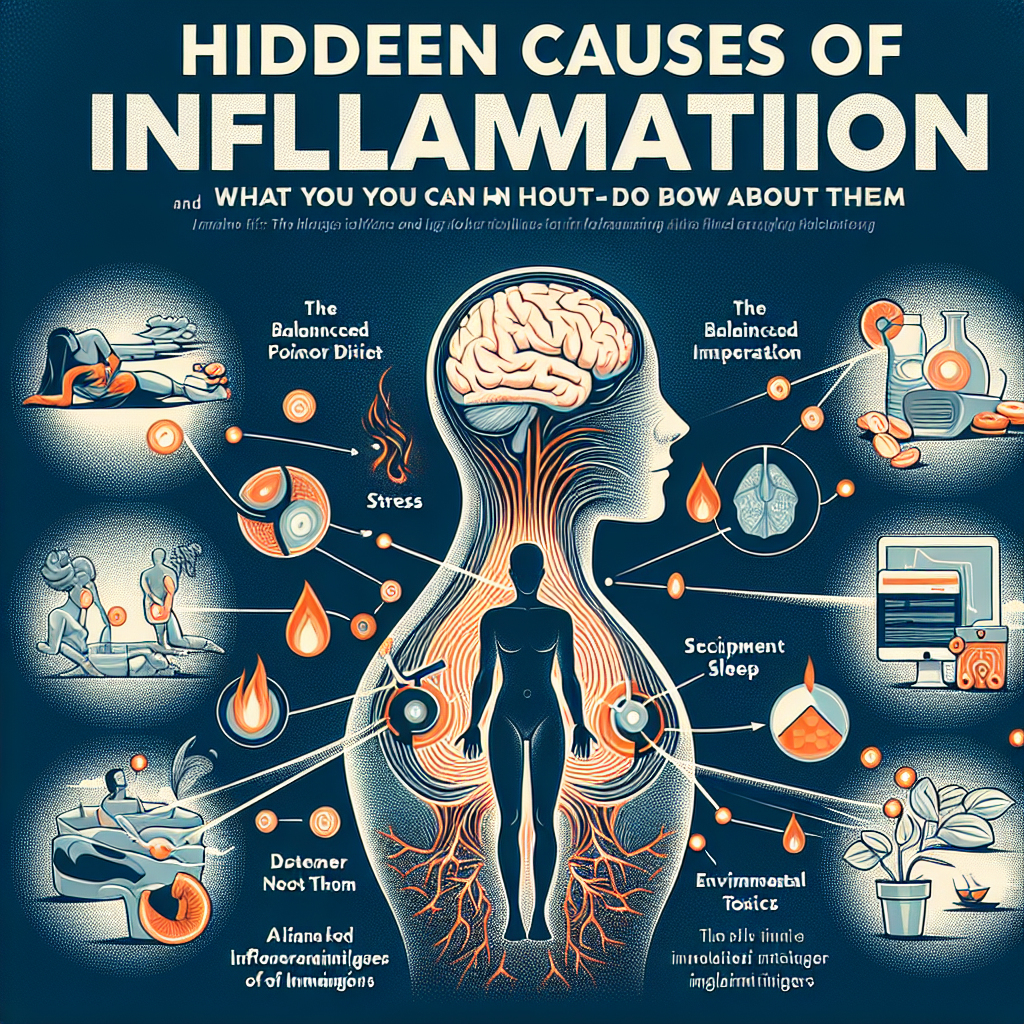Hidden Causes of Inflammation (and What You Can Do About Them)

Discover the hidden causes of inflammation and learn what you can do to combat them. Empower your health journey today by visiting www.myvibrantvitality.com. Take control of your health now!
Unveiling the Hidden Causes of Inflammation and Effective Remedies
Inflammation is a natural response of the body to injury or infection, acting as a protective mechanism to eliminate harmful stimuli and initiate the healing process. However, when inflammation becomes chronic, it can lead to serious health conditions such as heart disease, diabetes, and cancer. While it’s common knowledge that poor diet, lack of exercise, and smoking can trigger inflammation, there are several hidden causes that often go unnoticed. Understanding these hidden triggers and how to counteract them can significantly reduce the risk of chronic inflammation and its associated health problems.
One of the lesser-known causes of inflammation is chronic stress. When we are under constant stress, our body produces stress hormones like cortisol. Over time, excessive cortisol can lead to an overactive immune system, causing inflammation. Therefore, managing stress through techniques such as meditation, yoga, or deep-breathing exercises can help reduce inflammation levels.
Another hidden cause of inflammation is poor gut health. The gut is home to trillions of bacteria, collectively known as the gut microbiome. When the balance of these bacteria is disrupted, it can lead to a condition called dysbiosis, which can trigger inflammation. Consuming a diet rich in probiotics and prebiotics, which promote the growth of beneficial gut bacteria, can help restore this balance and reduce inflammation.
Lack of sleep is another often overlooked cause of inflammation. During sleep, our body works to repair and restore itself, including managing inflammation. When we don’t get enough sleep, this process is disrupted, leading to increased inflammation. Therefore, ensuring you get a good night’s sleep is crucial in managing inflammation.
Environmental toxins, such as air pollution and chemicals in our food and water, can also contribute to inflammation. These toxins can cause oxidative stress in our bodies, leading to inflammation. While it’s impossible to completely avoid these toxins, we can reduce our exposure by eating organic foods, using natural cleaning products, and filtering our water.
Now that we’ve unveiled these hidden causes of inflammation, let’s explore some effective remedies. As mentioned earlier, managing stress, improving gut health, and getting enough sleep are all crucial steps in reducing inflammation. Additionally, regular exercise is one of the most effective ways to combat inflammation. Exercise not only helps to reduce stress and improve sleep, but it also helps to regulate the immune system and reduce inflammation.
Diet also plays a crucial role in managing inflammation. Consuming a diet rich in anti-inflammatory foods, such as fruits, vegetables, whole grains, and lean proteins, can help to reduce inflammation. On the other hand, foods high in sugar, saturated fats, and processed ingredients can trigger inflammation and should be avoided.
Lastly, certain natural supplements can also help to reduce inflammation. For instance, omega-3 fatty acids, found in fish oil, have been shown to reduce inflammation. Other supplements, such as turmeric and ginger, also have potent anti-inflammatory properties.
In conclusion, while inflammation is a natural and necessary part of our body’s defense mechanism, chronic inflammation can lead to serious health problems. By understanding the hidden causes of inflammation and implementing effective remedies, we can manage inflammation and reduce our risk of chronic diseases. Remember, it’s always important to consult with a healthcare professional before making any significant changes to your diet or lifestyle.
Exploring the Underlying Triggers of Inflammation and How to Counteract Them

Inflammation is a natural response of the body to injury or infection, acting as a protective mechanism to eliminate harmful stimuli and initiate the healing process. However, when inflammation becomes chronic, it can lead to serious health conditions such as heart disease, diabetes, and cancer. While it’s common knowledge that poor diet, lack of exercise, and smoking can trigger inflammation, there are several hidden causes that often go unnoticed. Understanding these underlying triggers is crucial in managing and preventing chronic inflammation.
One such hidden cause is chronic stress. When we are under constant stress, our body produces stress hormones like cortisol. While cortisol can suppress inflammation in the short term, chronic stress leads to an overproduction of cortisol, which eventually becomes less effective. This can result in the immune system becoming out of control, leading to persistent inflammation. Therefore, managing stress through techniques such as meditation, yoga, and deep breathing exercises can significantly reduce inflammation levels.
Another often overlooked cause of inflammation is poor gut health. The gut is home to trillions of bacteria, collectively known as the gut microbiome. When the balance of these bacteria is disrupted, it can lead to a condition known as ‘leaky gut syndrome’, where toxins and bacteria leak into the bloodstream, triggering an inflammatory response. Consuming a diet rich in probiotics and prebiotics, which promote a healthy gut microbiome, can help prevent this. Foods such as yogurt, sauerkraut, and bananas are excellent sources of these beneficial bacteria.
Sleep deprivation is another hidden trigger of inflammation. Lack of sleep disrupts the body’s circadian rhythm, leading to an increase in the production of inflammatory cytokines. Ensuring you get a good night’s sleep is therefore essential in keeping inflammation at bay. Establishing a regular sleep schedule, avoiding caffeine and electronic devices before bed, and creating a calm and quiet sleep environment can all contribute to better sleep quality.
Environmental toxins, found in everything from the air we breathe to the products we use, can also contribute to inflammation. Prolonged exposure to these toxins can overburden our body’s detoxification system, leading to chronic inflammation. While it’s impossible to completely avoid these toxins, we can reduce our exposure by choosing natural, non-toxic products, and ensuring our homes are well-ventilated.
Lastly, sedentary behavior is a less obvious but significant contributor to inflammation. Regular physical activity reduces inflammation by releasing anti-inflammatory substances and promoting a healthy immune response. Incorporating regular exercise into your routine, whether it’s a brisk walk, yoga, or a gym workout, can help keep inflammation levels in check.
In conclusion, while inflammation is a natural and necessary response of the body, chronic inflammation can lead to serious health problems. By understanding and addressing the hidden causes of inflammation, such as chronic stress, poor gut health, sleep deprivation, environmental toxins, and sedentary behavior, we can take proactive steps to manage and prevent chronic inflammation. This not only improves our overall health but also enhances our quality of life.
Decoding the Secret Causes of Inflammation and Practical Solutions
Inflammation is a natural response of the body to injury or infection, acting as a protective mechanism to eliminate harmful stimuli and initiate the healing process. However, when inflammation becomes chronic, it can lead to serious health issues such as heart disease, diabetes, and cancer. While it’s common knowledge that poor diet, lack of exercise, and smoking can trigger inflammation, there are several hidden causes that often go unnoticed. Understanding these secret triggers and implementing practical solutions can help manage and prevent chronic inflammation.
One of the lesser-known causes of inflammation is chronic stress. When we are under constant stress, our body produces stress hormones like cortisol. Over time, excessive cortisol can lead to an overactive immune system, causing inflammation. Therefore, managing stress through techniques such as meditation, yoga, or even simple deep-breathing exercises can significantly reduce inflammation levels.
Another hidden cause of inflammation is poor gut health. The gut is home to trillions of bacteria, collectively known as the gut microbiome. When the balance of these bacteria is disrupted, it can lead to a condition called ‘leaky gut’, where toxins and bacteria leak into the bloodstream, triggering an inflammatory response. To maintain a healthy gut, it’s crucial to consume a diet rich in fiber, probiotics, and prebiotics, which can nourish the gut bacteria and prevent inflammation.
Lack of sleep is another often overlooked cause of inflammation. During sleep, our body repairs and restores itself, and a lack of sleep can disrupt this process, leading to increased inflammation. Therefore, ensuring a good night’s sleep by maintaining a regular sleep schedule and creating a restful environment can help control inflammation.
Environmental toxins, such as air pollution and chemicals in personal care products, can also contribute to inflammation. These toxins can trigger an immune response, leading to chronic inflammation. To minimize exposure to these toxins, it’s advisable to use natural personal care products and ensure good indoor air quality by using air purifiers or keeping indoor plants.
Lastly, sedentary behavior or lack of physical activity is a hidden cause of inflammation. Regular physical activity can reduce inflammation by regulating the immune system and reducing body fat, which is a major source of inflammatory substances. Therefore, incorporating regular exercise into your daily routine can significantly reduce inflammation.
In conclusion, while inflammation is a natural response of the body, chronic inflammation can lead to serious health issues. By understanding the hidden causes of inflammation such as chronic stress, poor gut health, lack of sleep, environmental toxins, and sedentary behavior, we can implement practical solutions to manage and prevent chronic inflammation. These solutions include stress management techniques, a diet rich in fiber, probiotics, and prebiotics, a good night’s sleep, minimizing exposure to environmental toxins, and regular physical activity. By taking these steps, we can not only reduce inflammation but also improve our overall health and well-being.